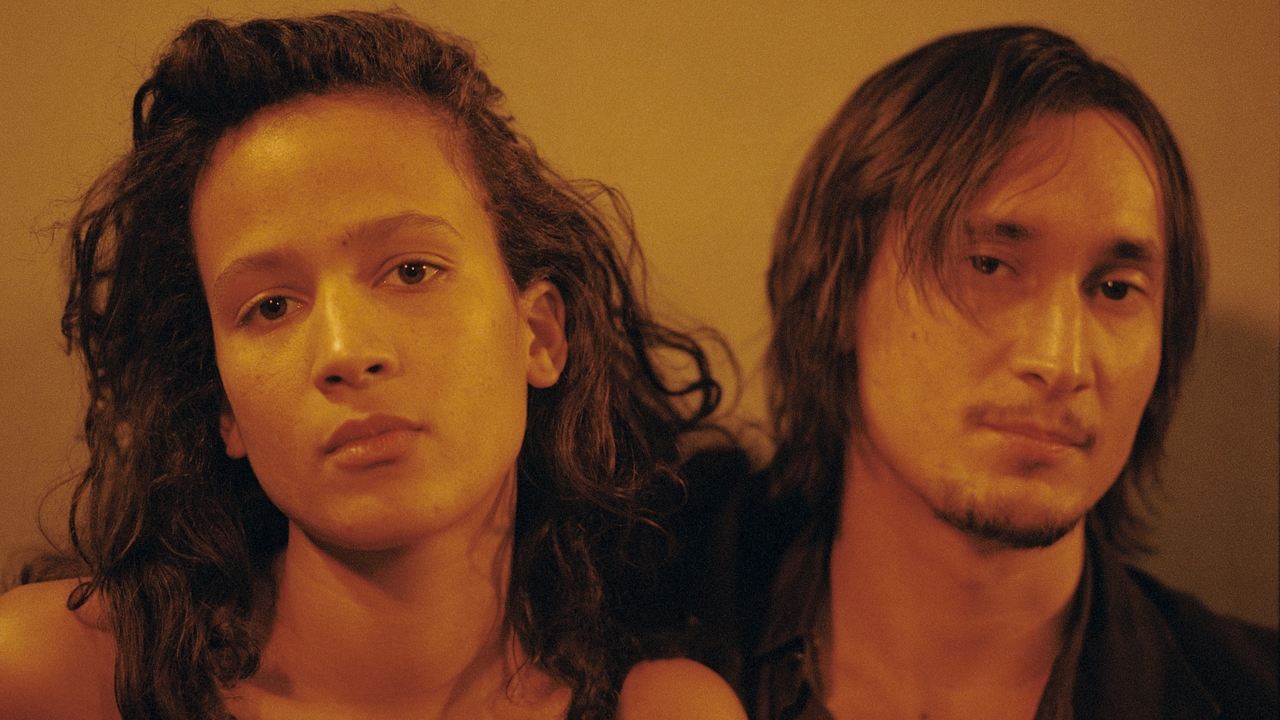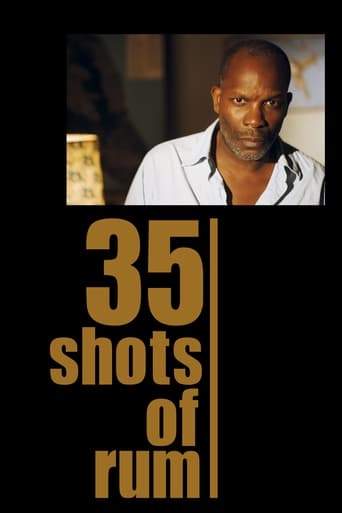

Contrary to another review here I found the film very enjoyable and interesting, although for the same reasons ;-) In my view, the film establishes the relationships among its central characters, in particular father (Lionel) and daughter (Josephine) through their actions, everyday behavior and their various looks (gazes, glances, observations). The way I read it (but the beauty of the film is in part that multiple readings are possible) it is mostly about the letting go of father and daughter, a musing on the "Father of the Bride" theme; in total contrast of course to the comedies of that title.Indeed the film has hardly any plot but interior developments; hardly any action, but a lot of movement; hardly fun but great possibilities of enjoyment.
... View More35 Shots of Rum (35 Rhums), Claire Denis, 2008, continues Denis' portrayal of Europeans of African ancestry with this quietly unfolding parable of a daughters deep love of her father and his pangs of guilt in accepting her companionship (he is a widower) which he comes to see is an unhealthy dependency preventing her from forming her own emotional life with her boyfriend. The scene is a Parisian apartment building in which Jo and her father Lionel share friendships with Noe, Jo's boyfriend, and Gabrielle, a single woman who drives her own taxi. The obvious parings are prevented from developing by Jo'e inertia brought on by her contentment with the arrangement and the resolution hinges on the death of Noe's cat and the discovery of by Jo of a note from Gabrielle to Lionel. The films attractions are the expected artistry of Cinematographer Agnes Godard and the deft direction of Denis in which emotions and attitudes are conveyed with great economy. Denis uses imagery of movement throughout the film as Lionel is a commuter train engineer who uses a motorcycle for personal transport; Gabrielle drives her taxi; and Jo rides trains to her classes. There is a brief moment of something like magic realism with Jo and her father on horse back galloping down the underground tracks. All this contrasts with the quiet lives at the apartment. One odd note is the depiction of Jo at classes where the subject of the monetary domination of the northern countries over the southern. The word revolution is mentioned and a brief scene of a protest is inserted art one point. This contrasts, consciously or not, with a decidedly up scale apartment with furnishings that suggest a background far different from a train engineer. Except for her film Chocolate, I never noticed any overt socio/ political agenda in her films.
... View MoreA long, pretentious and boring mess, ending in a mushy inexplicable scene set up only to get the title worked into the film. It goes nowhere... mostly because it hardly has a plot, it is just enigmatic observations.Denis's strives for realism and humanism; but the only rare viewer can possibly identify with the film due to its purposely vague non-plot. Or to its characters who are just living their mundane lives. This film uses a manipulative narrative structure and its characters are mostly connected by lifeless staring or slight movements. The character development is nothing more than an hour and a half of watching them perform the most trivial and mundane of tasks. Nothing much happens. And the scenes in which nothing much happens drag on endlessly. This slice of life film was far less enjoyable than a slice of soggy pizza.
... View More"35 Rhums" (2008) Dir.: Claire Denis'35 Rhums' is a slow, elliptical and deliberate film revolving around the four tenants of a house in what appears to be the greater Paris area. At its core are a father (Lionel) and his late-teenage daughter (Josephine), with the middle-aged taxi driver Gabrielle and the impulsive young Noe, living downstairs with his cat, rounding off a kind of extended family. They seem closer than your usual co-tenants and there's a suggested intimacy behind their functional and un-dramatic interactions, though this is all left unexplained for quite some time; indeed, so much so that it's tempting for the viewer to wonder if they've missed some crucial dialogue or failed to infer something that Claire Denis has intended them to. But this is a film that rewards not only patience but also a keen eye for behavioural detail. The realism of '35 Rhums' lies in its understatement of the relationships, shared histories, and occurrences (large and small) that make up the story. This is, I think, one of the finer points of the film, though it only became apparent upon further reflection.Lionel is a train driver and his daughter is a student. The absence of a mother in the apartment is immediately clear but, like many other aspects of the film, the specifics are not elaborated on as part of the setup. Neither is the wistfulness of Gabrielle as she chain-smokes and awaits Lionel's return home from nights at work, where his co-worker Rene is depressed about his upcoming retirement. (We see that the colleagues are as close-knit as the tenants.) Noe is restless and muses on his tendency not to settle anywhere too long. In an amusing scene, he discovers his aged cat has died in her sleep and offhandedly decides to take a job in Angola because there's nothing to stick around for any longer. This upsets Josephine, and she takes off to Germany with her father for a few days.All this occurs within a fairly short time frame, and in between we are shown glimpses of the unexplained histories that made the first half of the film a little vague. In fact, there is a particular scene where I felt that the movie really connected itself: Gabrielle's cab breaks down on the way to a concert, and the four co-tenants are sheltered from a rainstorm in an empty bar. Resigned to the evening's ruined plans, they eat and drink away, and over this long set piece all the hints and glances and suggestions of the preceding scenes are brought together and made into something tenable. From here, '35 Rhums' leads us successfully through moments of comedy, tragedy and finality. Crucially, it never changes its pace or its observational filming style after this point. To do so would cheapen the tone of the introductory hour, and be rather jarring at that. It reaches its end without any great resolution, which could be seen as a weakness by anyone still expecting a traditional climax by this stage. But if you're already this far into the film (and this review), that probably doesn't apply to you. We are left to assume that the characters' lives simply go on, though not unchanged by certain events and discoveries that I won't spoil for anyone here.The impression I came away with is that '35 Rhums' is an intimate film about the culmination of people, events of the past and present, and how these can close off little chapters of our lives and sometimes go unnoticed. It is not for everyone, and it is definitely not flawless - there's some dangling symbolism to do with rice cookers (yup, you read right), and I can't work out if Claire Denis is trying to make a social point with the virtually all-black casting. Aside from a short scene at the university where students are discussing the Third World debt, it seems to be entirely incidental (which, in turn, makes the dialogue in that scene appear incidental also). But my knowledge of urban French societal make-up is nil, so I can't comment further. It is essentially a decent and touching work, very well acted and captured, and if you have patience and aren't averse to a definite French style, then it could be your kind of movie.
... View More